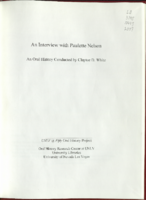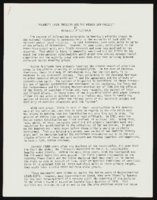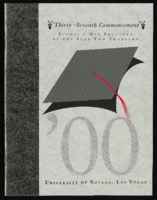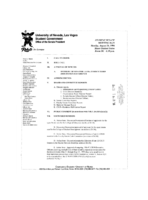Search the Special Collections and Archives Portal
Search Results

Transcript of interview with Craig Palacios by Stefani Evans and Claytee White, September 27, 2016
Date
Archival Collection
Description
Craig Palacios was born on November 1, 1971 and grew up in the Paradise Palms neighborhood in Las Vegas, Nevada. His family lived close to him and he remembers playing with his relatives up and down the Maryland Parkway Corridor. His first job was in construction where he poured and finished concrete. His talents for design became apparent and he began a new job as a swimming pool designer. Craig’s first company was a concrete company, but he later had to close its doors. After that, Craig decided to attend college and graduated with degrees in Architecture and Art History from UNLV in 2005. He worked for YWS Architecture for a few years before opening his own studio in 2011. Since then, BunnyFish Studio has worked on the Downtown Project and the Maryland Parkway Project.
Text

Louis Yoxen interview, 2003: transcript
Date
Archival Collection
Description
Yoxen begins her interview by discussing how she first arrived in Las Vegas, Nevada to work for the U.S. State Department in the 1950s. She then describes her childhood in Alabama, competing in the Miss America pageant, and her life in Miami, Florida. Yoxen also discusses living in North Africa and Berlin, Germany while working for the State Department as a clerk. She then talks about moving around with her sister and her family, and eventually coming to Las Vegas. She describes what Las Vegas was like in the 1950s. Yoxen ends her interview with a discussion on her family, her husband's work, and their recreational activities.
Text

Transcript of interview with Judge Lee Koury by Claytee White, February 6, 2013
Date
Archival Collection
Description
Born in 1932 and raised in Los Angeles; mother was a housewife and later became a painter; mention of Olvera Street; Pio Pico first Mexican governor of California; Pico House; member of the Army; Deputy Sheriff; Mother Pauline Brown and father Lee Koury; Los Angeles County Sharon Tate; LaBiancas; Spahn Ranch; "the three girls on the comer" - Lynette Fromme, Sandra Good, and Nancy Pitman; Family - referring to the Manson case - Charles Mason, Robert Beausoleil, Susan Atkins, Steve Dennis Grogan, Patricia Kernwinkle, Mary Theresa Brunner, Bruce McGregor Davis, and Leslie VanHawten; Shorty Shay the person in charge at Spahn Ranch; mention of Polaroids mailed to prisoners that ended up being an important part of the Manson case.
Text

Transcript of interview with Paulette Nelson by Claytee D. White, March 2, 2009
Date
Archival Collection
Description
Text

Magdalena Martinez oral history interview: transcript
Date
Archival Collection
Description
Oral history interview with Magdalena Martinez conducted by Monserrath Hernandez and Barbara Tabach on April 4, 2019 for the Latinx Voices of Southern Nevada Oral History Project. In this interview, Magdalena Martinez recalls her childhood and growing up in Los Angeles, California. Martinez's parents are from Durango, Mexico, and immigrated to the United States in the 1970s. Martinez describes the generational differences that the women in her family faced and how the feminist movement of the 1970s did not resonate with women of color. Her family moved to Las Vegas in 1986 where she attended Bishop Gorman High School. After transferring to the University of Nevada, Las Vegas (UNLV) from community college and joining a student organization that would later become Student Organization of Latinxs, she became an early member of the Latino Youth Leadership Conference (LYLC) sponsored by the Latin Chamber of Commerce. Martinez describes how the LYLC has evolved over the years, and talks about her role in those changes. She discusses past work for CSN, NSHE, and currently is the Director of Education Programs with the Lincy Institute.
Text

"Minority Labor Problems and the Hoover Dam Project": manuscript draft by Roosevelt Fitzgerald
Date
Archival Collection
Description
From the Roosevelt Fitzgerald Professional Papers (MS-01082) -- Unpublished manuscripts file.
Text

University of Nevada, Las Vegas (UNLV) 37th commencement program
Date
Archival Collection
Description
Commencement program from University of Nevada, Las Vegas Commencement Programs and Graduation Lists (UA-00115).
Text

Meeting minutes for Consolidated Student Senate University of Nevada, Las Vegas, March 2, 1998
Date
Archival Collection
Description
Text

Meeting minutes for Consolidated Student Senate University of Nevada, Las Vegas, June 9, 1997
Date
Archival Collection
Description
Text

Meeting minutes for Consolidated Student Senate University of Nevada, Las Vegas, August 26, 1996
Date
Archival Collection
Description
Text
